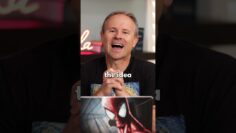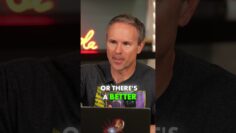
To the Point LIVE with Jon Noyes: Atheism
There are important details of the real world that atheists “bump into” all the time that make no sense in the atheist’s materialistic world. On the other hand, these details fit perfectly into the Christian account of reality.
In this episode of To the Point, Jon describes his personal journey from atheism to Christianity. He explores the “bumps into reality” that led him to understand that Christianity is the best explanation for the way things really are.
#StandtoReason #Apologetics #Christianity
——————————– CONNECT ——————————–
Website: https://www.str.org/
Twitter: https://twitter.com/STRtweets
Facebook: https://www.facebook.com/standtoreason93
Instagram: https://www.instagram.com/standtoreason
LinkedIn: https://www.linkedin.com/company/stand-to-reason/
—— FIND MORE FREE APOLOGETICS VIDEOS ——-
Stand to Reason University is an online training program designed to produce a particular kind of person: an effective ambassador for Christ. Using short, interactive, and engaging courses, STR U equips Christians to make an even-handed, yet gracious defense for Christianity and Christian values in the public square.
Sign Up for STR University: https://training.str.org/
———————————— GIVE ————————————
Support the work of Stand to Reason: https://www.str.org/donate
source











mr Noyes, please demonstrate a nothing;
It seems to me that nothing is like infinity; it is not a quantity, but describes a process of always adding one more; there is no limit to the process, but we can not know if such a process actually exists; nothing is like that; it is the process of subtraction; but we can not know if an ultimate subtraction can exist; so if you do not known weather an actual nothing can exist, how can you declare what or what not can come from it?
"We have a soul, we are a soul." Which is it?
As a rational empiricist, I find the existence of God to be inescapable and I find the historicty of the New Testament documents to be rationally and empirically compelling. Therefore I believe in the existence of the God of the New Testament, I believe Jesus died for my sins and rose from the dead, and I believe that the Bible provides a totally satisfying moral, psychological, spiritual, biological, intellectual, emotional guideline for my life.
On the question of would I kill someone if God told me to kill someone, it might be worth pointing out that the Canaanite Genocides were all about a group of people being told to kill another group of people. The only instance I can think of where an individual was told to kill another individual was Abraham/Isaac and God prevented it from happening. So if I as an individual felt God was telling me to kill a particular group of people, then I would still need that calling to be backed up by others agreeing that this is what God has told them too.
You don't have to ask "why is there stuff"? As a Buddhist we don't ask that question. It's not important to what a Buddhist is trying to accomplish.
I think that we limit the possibilities by something vs nothing or creator vs evolution we should rather include the finite abilities of our small brains, "if you will" vs unknown dimensions of time and space and what we can not perceive or detect to rather than limiting to the box we include what's outside the box and wonder how great God is or isn't and how small we are or are not.
For a guy who was supposedly oh so skeptical and critical of Christianity you didn’t demonstrate familiarity with the actual scholarly versions of your own previously held viewpoints. Did you not read the great atheistic thinkers (Erik Wielenberg, Quentin Smith, Graham Oppy, J Howard Sobel)? Because they respond to the arguments that convinced you to leave atheism. What is your response to their objections? Or is Dawkins as far as you got? Because he doesn’t respond well. Maybe familiarize yourself with the best arguments that the naturalists/atheists use before being so quick to criticize them instead of focusing on new atheist garbage. Or would you prefer that I just read Ray Comfort and project his nonsense on to every other Christian without reading Swinburne, Craig, Feser, and Pruss? Steel man each side and you’ll be surprised how substantive both sides of the debate can be. Then you’ll understand why some scholars agree and others disagree with you.
These are good practical breakdowns of the cosmological argument, teleological argument, and the moral argument.